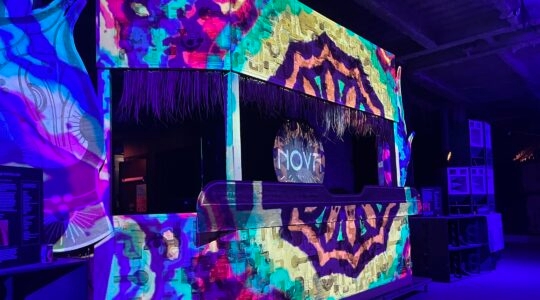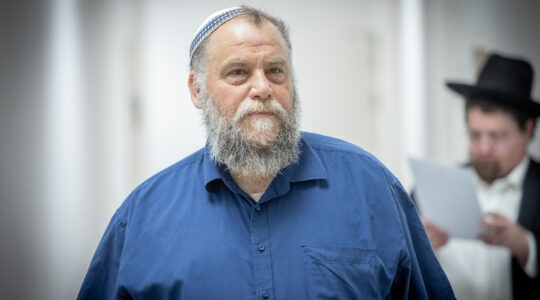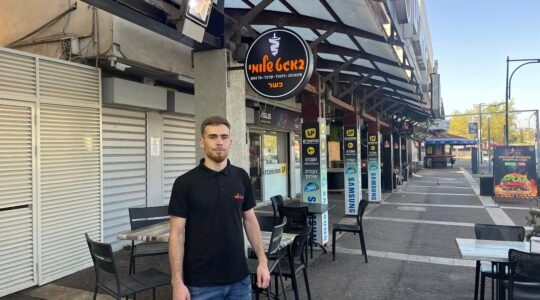NEW YORK (JTA) — The weeks leading up to the inauguration of a new U.S. president can be heady times for those seeking the ear of the incoming administration. So it was no surprise that among Jewish groups, even those with opposing views, saw an opportunity over the weekend to rally their members and stake their positions early.
Capitalizing on the singular political moment, liberal Jewish thinkers and activists gathered at an all-day conference Sunday titled “Jews Uniting to End the War and Heal America: Organizing for Action.” Sponsored by The Shalom Center, Jewish Currents and Workmen’s Circle/Arbeter Ring, the program summoned anti-war activists from the Jewish community who appealed to the incoming administration to end the war in Iraq.
“We want to be heard,” said Rabbi Ellen Lippmann of Brooklyn’s Kolot Chayeinu congregation, who helped organize the conference at the Central Synagogue in midtown Manhattan. “Not to let some voices dominate policy, but to hopefully have some influence with the new administration.”
Thirteen city blocks to the south — and several degrees to the right politically — the Zionist Organization of America celebrated its 111th Anniversary Justice Louis B. Brandeis Dinner at the Grand Hyatt Hotel. Early in the program, U.S. Rep. Anthony Weiner (D-N.Y.) highlighted the subtext of this year’s dinner taking place during President-elect Barack Obama’s transition period.
“People are going to be reassessing the very foundations of our discussion about Israel,” he said. “They are going to be questioning the things we’ve taken for granted in the past.”
For many at the ZOA event, this means pushing the Obama administration to keep up the fight against Islamic fundamentalism — and step back from supporting the Palestinian Authority or pushing any new diplomatic initiatives that could lead to pressure on Israel.
To be sure, the sentiment that policies are being re-evaluated galvanized organizers of the anti-war conference to plan their event, even before knowing the outcome of the American presidential election.
“For too many years, the American Jewish community has not acted on our deepest values with enough vigor,” said Rabbi Arthur Waskow, the director of The Shalom Center.
Using a metaphor of a tugboat that steers large ocean liners, Waskow urged conference attendees to change the course of mainstream Jewish organizations and public opinion. He also touted increased international and interreligious dialogue and peacemaking efforts in Israel.
“It needs to be picked up,” he said, “and the U.S. government needs to insist that it be picked up by Israel and the other powers in the Middle East.”
During panel discussions, speakers acknowledged that the Obama administration’s first priority would be the economy. But they also stressed the need to combat rhetoric like the “war on terror,” and they discussed options for promoting alternatives to views promulgated by established Jewish organizations, which have turned their attention to the threat of an Iranian attack on Israel.
“If we are going to go to Washington and say ‘We represent the Jewish community,’ we need to take that on,” said Jeremy Ben-Ami, the executive director of J Street and JStreetPAC, new outfits dedicated to promoting a stepped-up U.S. role in Mideast peacemaking. “We are going to have an answer that isn’t” just about criticizing other Jewish organizations.
Leslie Cagan, the national coordinator for United for Peace and Justice, acknowledged that Iraq and other foreign policy issues are not the top items on the public’s agenda these days.
“The economy, understandably, is the issue most on people’s minds,” Cagan said. But she stressed that economic concerns could be parlayed into a strong anti-war argument that highlights the war’s “tremendous drain on our treasury” and America’s “outrageous” military budget.
“We need to change the construct of this war on terror,” she told the audience at an afternoon plenary. “Aside from self defense, how can we justify any war?”
At least one answer to that question came during the ZOA dinner, when presentations focused on security threats facing Israel. During the appetizer course, a video about the Nautilus tactical high-energy laser, which detects missiles and destroys them in mid-air, met resounding applause.
In a keynote address Anne Bayefsky, the editor of the Web site EYEontheUN.org, described the annual U.N. International Day of Solidarity with the Palestinian People, which took place Nov. 24. The United Nations, she said, “has become the largest global purveyor of anti-Semitism in the world today,” and “Israel is in its pincers.”
Morton Klein, the ZOA’s president, told JTA that he was a “big activist” against the Vietnam War, and that he wants nothing more than Middle East peace — but it can only be achieved with tough measures.
“This war against Islamic terror is a critically necessary war,” he said. “We want to send a message that U.S. aid and negotiating with the Palestinian Authority must be contingent upon the Palestinian Authority fulfilling their 15-year obligation to end incitement, arrest terrorists and outlaw terror groups.”
Back on the dais and speaking to the crowd, Klein conjured threats posed by Iran. He also described concerns about Obama’s strategy regarding Israel.
In particular, Klein spoke about recent news articles that described the president-elect’s possible support for a 2002 Saudi peace initiative that calls for Israel’s withdrawal to pre-1967 borders in exchange for Arab recognition of Israel. The proposal also provides for a Palestinian capital in the eastern part of Jerusalem.
“I’m very worried that President-elect Barack Obama is supportive of this peace initiative,” Klein said.
The ZOA leader described a conversation he had about Jerusalem with Obama’s advisers: “They think it is holy to both Islam and Judaism,” he said.
Klein added a rallying cry: “We will not make concessions” on Jewish land.





